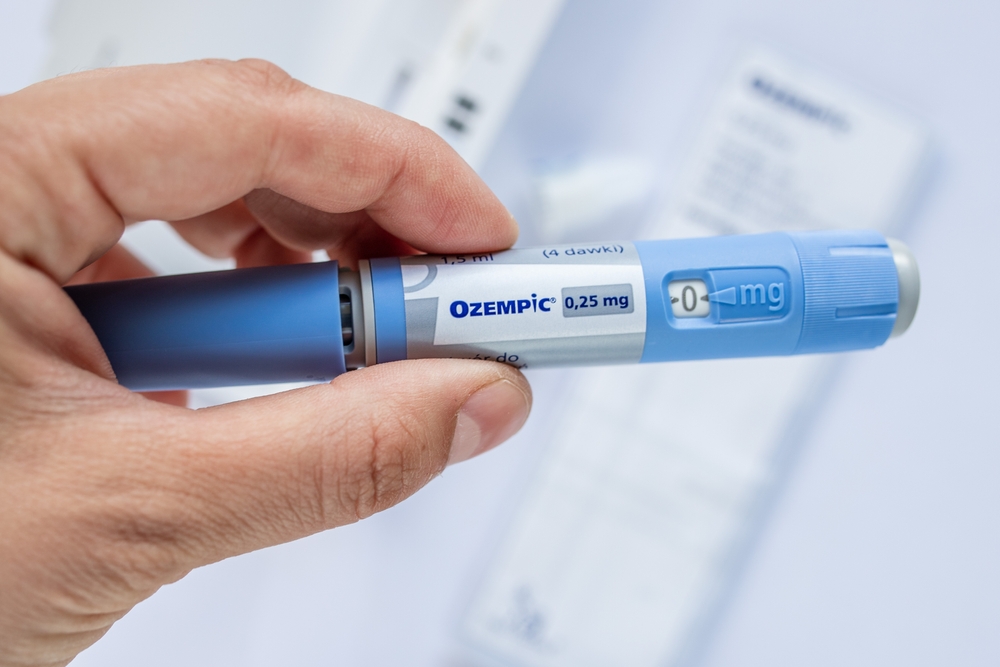Ozempic: What Is It?
Ozempic is a prescription drug that has FDA approval for the management of adult type 2 diabetes. According to studies referenced on Ozempic’s website, it has been shown to reduce hemoglobin A1C, a measure of blood glucose over time, and help improve blood sugar in people with type 2 diabetes. It also reduces the risk of cardiovascular events, including heart attacks and strokes, in people with type 2 diabetes and established heart disease.
The main part of Ozempic that works is semaglutide, which binds to and activates the glucagon-like peptide-1 (GLP-1) receptor. It works by increasing the effects of the hormone GLP-1, which is produced naturally, and activating GLP-1 receptors throughout the body.
According to Christopher McGowan, M.D., founder of True You Weight Loss in North Carolina and a gastroenterologist with expertise in endobariatrics and obesity management, “GLP-1 serves multiple key functions in the body.” It increases the pancreas’s ability to produce insulin in response to meal consumption, which aids with blood sugar regulation. Similarly, it lessens the hormone glucagon’s secretion, which raises blood glucose and aids with blood sugar regulation.
Ozempic is a weekly, self-administered semaglutide injection. It is available in quantities of 0.5, 1 or 2 milligrams.
Does Ozempic help people lose weight?
Studies have shown that semaglutide, the active component of Ozempic, is effective in helping people lose weight. It’s critical that individuals maintain their weight reduction efforts by changing their diets and workout routines.
Ozempic is not recommended for shedding pounds. Semaglutide, however, is authorized for use in weight reduction under the brand name Wegovy. Compared to Wegovy, Ozempic has a lower dosage of semaglutide.
It’s crucial to remember that if you begin using one of these medications for weight reduction, your body can adjust and create a new normal. This may lead to a plateau in your weight. Studies have shown that stopping Ozempic (or Wegovy) will probably cause you to regain the weight you lost.
Does Ozempic help people with type 2 diabetes?
For individuals with type 2 diabetes, Ozempic is administered as a once-weekly injection to control blood glucose levels and HbA1c.
It functions as a GLP-1 analogue by raising the hormone incretin levels, which encourages your body to create more insulin as required. Additionally, it suppresses the liver’s ability to generate glucose.
Ozempic users with type 2 diabetes may have weight loss while taking the drug; this is partially because of its effects on:
- lowering your appetite to consume fewer meals
- causing the meal to pass more slowly through your digestive system, keeping you fuller for longer.
Ozempic: Is It Safe?
Fatima Cody Stanford, M.D., an obesity medicine physician-scientist at Massachusetts General Hospital, associate professor of medicine and pediatrics at Harvard Medical School Unit, and advisory board member of Sweetch, states that “Ozempic is a safe medication with a variety of benefits.
” Eighty percent of people with type 2 diabetes also have obesity at the same time. Therefore, these individuals get dual benefits for the management of their obesity and diabetes.
Dr. Cody Stanford continues, “Ozempic has also been demonstrated to lower major adverse coronary events, such as heart attacks and strokes, and offers a host of other benefits.”
Ozempic isn’t safe for everyone, however. The following circumstances, according to the business, should prevent users from utilizing Ozempic:
- Diabetes Type 1 and pancreatitis
- younger than eighteen
- either nursing or pregnant
- Diabetic eye disease
- issues relating to the kidneys or pancreas
- Medullary thyroid cancer (MTC) in the family history
- MEN 2, or multiple endocrine neoplasia syndrome, is an endocrine system disorder
- It’s crucial to speak with your doctor or another licensed healthcare professional about whether this medicine is safe for you and what dose is right, just as you would with any prescription drug.
Common Ozempic Side Effects
Dr. McGowan says, “Ozempic is a very safe medication overall.” “The gastrointestinal side effects that occur most frequently are nausea, vomiting, diarrhea, and constipation.
” According to Dr. McGowan, although the majority of Ozempic users may probably suffer these adverse effects at some point throughout their therapy, they should eventually go away.
“Early satiety [fullness] may occur because Ozempic slows down gastric emptying,” continues Dr. Alexander. She advises people to eat carefully in order to mitigate these and other gastrointestinal adverse effects of Ozempic.
“These are usually transient side effects that go away within a few days to a few weeks of starting Ozempic or adjusting the dosage,” she continues.
According to the manufacturer, using Ozempic may result in other, less frequent, but more severe adverse effects. Among them are:
- Pancreatitis, or pancreatic inflammation
- Vision shifts
- Low blood sugar, or hypoglycemia
- renal issues
- Reactions to allergens
- issues with the gallbladder

